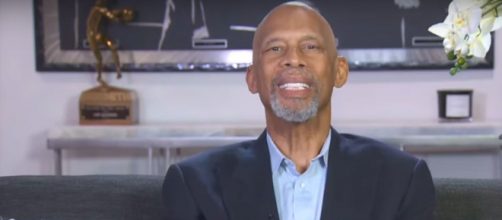This morning, June 1, Kareem Abdul-Jabbar was a featured guest on “CBS This Morning,” and as always, the immortal NBA center deferred being the center of attention. He was the subject of an interview with Gayle King because of the incisive, scorching, and some might call surprising, truths exposed in his Sunday LA Times essay, as reported by the morning show and USA Today.
Even before taking on the Muslim mantle and identity of Kareem Abdul-Jabbar (formerly Lew Alcindor) in 1971, after blazing with the Milwaukee Bucks to the team’s first NBA championship at age 24, the superlative athlete was a student of history, languages, architecture, and numerous other disciplines.
His last visit on “CBS This Morning” was in February, when he detailed the crucial and roles of African Americans who were pivotal in standing against British rule during the American Revolution.
Abdul-Jabbar served as executive producer for “Black Patriots: Heroes of the Revolution” for the History Channel. Another jarring time of revolt is gripping America at the moment, in the wake of the unimaginable murder of George Floyd. The stakes might be different, but the instigators are justified, according to the eloquent essayist. This dialogue was as timely and important as anything on cable news TV Shows.
Social-activist Kareem Abdul-Jabbar speaks out for those shoved a step too far
“Don’t understand the protests?
What you are seeing is people pushed to the edge,” Kareem Abdul-Jabbar titles the brutally honest reflection. He insists that even the wrong attention is sometimes essential for change.
There are a million euphemisms attached to headlines and tributes today-- one swallow too many of injustice, voices unheard again and again, one misdeed too much. Every single soppy expression of understanding fails to capture that a human life has been taken, and one human life is a treasured gift for which no compensation can be granted. Abdul-Jabbar maintains that good behavior often yields no change.
“Everybody remembers what Colin Kaepernick went through,” reminds the record-setting NBA All-Star. “That was a peaceful protest, but he was ostracized, he lost his job, and he was blackballed,” for the act of kneeling to bring notice to police brutality.
“That's what it got him and nothing has changed,” reiterates Abdul-Jabbar. The same can be said of Rodney King and his altruistic appeal of “Can't we all just get along” 30 years ago. People of color, the marginalized, and those without power remain in basically the same strata as generations ago. Activist Abdul-Jabbar simply asks, “What tools do they have to affect change?” Grabbing media headlines can be their only means to an end.
Racism is like deadly, omnipresent dust particles, describes Kareem Abdul-Jabbar
Just as communities of color are being mercilessly stricken and dying due to the COVID-19 pandemic, with probable spikes coming in the aftermath of the protest movement for justice, Kareem Abdul-Jabbar relates that racism is deadlier than the virus.
He writes that “sheltering in place for the rest of our lives” may be the only certain way for black men to stay alive.
The basketball great provided a perfect illustration for his “CBS This Morning” co-anchor, equating that for most people, racism is like a clean room. Ostensibly, everything looks fine from the outside, but when any piercing light shines in, particles are in motion everywhere. “Racism is ingrained in our society and it's taken for granted,” contends Kareem, and it ravages targeted populations with more virulence than the current malady.
Being counted and heard matters beyond the mayhem for Kareem Abdul-Jabbar
“I don't want to see stores looted or buildings burned,” Abdul-Jabbar stresses in his op-ed.
What he does understand, though, is that people pushed down and pushed enough will resort to whatever power they have, sometimes even destructive ones. 90% of these protests are completely peaceful, like the ones held today, attended by George Floyd’s brother, Terrance, and extended family.
Kareem Abdul-Jabbar exquisitely conveys his point through his prose, but he borrows from the poet, Langston Hughes in “Harlem.” “What happens to a dream deferred/Maybe it sags/Like a heavy load/Or does it explode?”
The socially-conscious legend was most moved by the sight of a sign asking: "Can you hear us now?" which sparked his response.
Social-activism is second only to the skyhook in the unique makeup and mastery of Kareem Abdul-Jabbar.
He expressed himself in his support of Mohammed Ali in not fighting the Vietnam War and in his decision to boycott the 1968 Olympics. He implores that this generation has “to cross the finish line with what needs to be done.”
Some key ways that the elder statesman endorses for this generation are to organize, strategize, and especially vote for change in the coming election. Abdul-Jabbar also suggests petitioning courts from the highest to the lowest to legally prosecute “bad cops” and to support positive law enforcement.
The daily lessons in the cries for social change seem especially hard to learn under a siege of a global pandemic, but compassion has become heightened, so hopefully, everyone can be seen and heard with different sensitivity.
Grief, desperation, and anger have caught this nation and its people between right and wrong within a simultaneous struggle with a never-seen virus. The plague of racism has been seen far too much. Blame is sadly a constant in human nature, but Kareem Abdul-Jabbar and this moment call us to be better and more human, neither right nor wrong.


